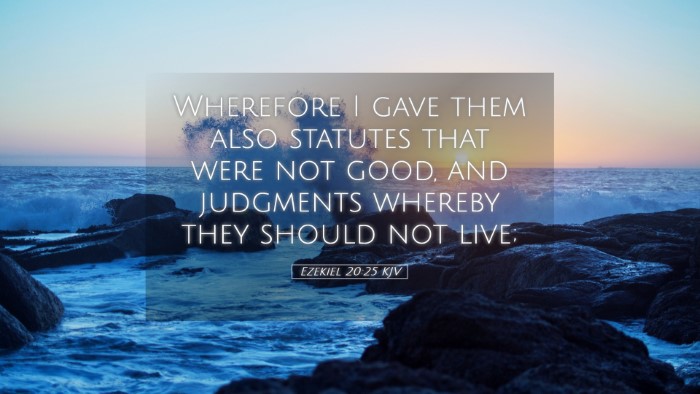Ezekiel 20:25 - Summary and Commentary
Verse Reference: Ezekiel 20:25
Text: "Wherefore I gave them also statutes that were not good, and judgments whereby they should not live."
Contextual Overview
The Book of Ezekiel is primarily a prophetic discourse directed towards the nation of Israel during their Babylonian exile. The prophet Ezekiel speaks on behalf of God, addressing the unfaithfulness of the Israelites and their need for repentance. In this specific verse, we find a profound declaration regarding the divine rationale behind the giving of statutes and judgments that are described as "not good."
Insights from Public Domain Commentaries
Matthew Henry's Commentary
Matthew Henry emphasizes God's sovereignty in His dealings with Israel. He suggests that the statutes which God calls "not good" reflect a divine strategy to demonstrate the futility of relying on human efforts to attain righteousness apart from divine grace. Henry notes that these decrees were intended to lead Israel to realize their deep need for a savior, showcasing the impossibility of life through mere observance of the law.
He believes that such statutes served a pedagogical purpose. They exposed the inability of the Israelites to achieve righteousness through their own strength, showing how far they had strayed from God’s original intent. Henry remarks that God’s disciplinary actions must lead to an awareness of their sinful condition, spurring Israel towards repentance and a right relationship with Him.
Albert Barnes' Notes
Albert Barnes offers insight into the implications of this verse regarding God's administration of justice. He explains that God permitted certain statutes, which had the effect of leading Israel into judgment rather than life. Barnes interprets this as a form of divine discipline that conveys a serious message about the consequences of disobedience. In essence, such statutes served to highlight the contrast between divine holiness and human sinfulness.
Barnes also emphasizes that the judgments given were not necessarily a reflection of God's character but were instead a means to achieve a larger purpose—namely, to ultimately bring about restoration and reconciliation. He infers that although the Israelites were subjected to harsh statutes, the hope of redemption remained attainable through sincere repentance and turning back to God.
Adam Clarke's Commentary
Adam Clarke provides a nuanced interpretation of this verse by suggesting that God's grant of "bad" statutes carries significant theological weight. Clarke argues that this is indicative of God's overarching sovereignty and justice, which operates even through human failures and missteps. He posits that the statutes served as a harsh reminder of the consequences of idolatry and unfaithfulness, functioning to instill a sense of gravity regarding sin among the Israelites.
Moreover, Clarke draws attention to the deeper theology surrounding this verse, asserting that God’s actions serve a dual purpose. On one hand, they act as a rebuke; on the other, they offer the unchanging hope of divine mercy. Clarke underscores the necessity for Israel to grasp their dire state and fully comprehend the nature of God's holiness, ultimately guiding them toward a renewed covenant relationship with their Creator.
Theological Implications
This verse points to a complex understanding of divine law and human nature. Several significant themes can be drawn:
- Human Inability: The statutes that led to death underscore the idea that human attempts at righteousness are fundamentally flawed without divine intervention.
- Divine Discipline: God's imposition of "not good" statutes showcases His role as a disciplinary figure, aiming to restore rather than destroy.
- Hope Amidst Judgment: While judgment is present, the prophetic voice signifies an underlying call to repentance and hope, leading to eventual renewal and restoration.
- God's Sovereignty: The narrative reinforces the sovereignty of God in orchestrating the affairs of nations and individuals towards His redemptive plan.
Application for Pastors, Students, and Scholars
For pastors, the discussion surrounding Ezekiel 20:25 presents an opportunity to speak on the grace that undergirds God’s justice. It lends itself to sermons aimed at emphasizing the need for true repentance and reliance on divine grace rather than human effort.
Students of theology can use this verse to explore the dynamics of God’s law, how it was intended, its effects on human behavior, and the progressive revelation found throughout Scripture. It offers a rich ground for academic discussion on the nature of God's plans throughout history.
For biblical scholars, the verse presents a complex interplay of divine sovereignty, human agency, and the redemptive arc of Scripture. Analysis can lead to explorations of historical context, linguistic nuances, and the theological discourse surrounding law and grace in both the Old and New Testaments.
Conclusion
The verse Ezekiel 20:25 serves as a radical reminder of the multifaceted nature of God’s law and the profound implications of sin. Through the commentaries of Matthew Henry, Albert Barnes, and Adam Clarke, a deeper understanding emerges—one that reflects on divine discipline, human inability, and the constant beckoning of God for His people to return to a state of grace.


